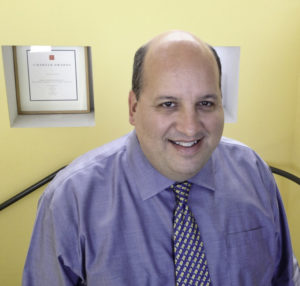By Catarina Kidd, AICP
 Ron Golem is Director of Real Estate and Transit-Oriented Development for Valley Transit Authority in San Jose. Before heading to VTA in 2015, he was a principal at BAE Urban Economics for 16 years and a project manager and realty specialist with the National Park Service (Presidio) for seven years. He holds a master’s in city planning from UC Berkeley.
Ron Golem is Director of Real Estate and Transit-Oriented Development for Valley Transit Authority in San Jose. Before heading to VTA in 2015, he was a principal at BAE Urban Economics for 16 years and a project manager and realty specialist with the National Park Service (Presidio) for seven years. He holds a master’s in city planning from UC Berkeley.
How has your career evolved over the years?
In my twenties, I was working in various aspects of real estate including asset management, leasing, and property management. After graduate school, I worked for the National Park Service in the Presidio before moving on to consulting and then finally to VTA. Each experience has a trade-off. In an agency, you work many different aspects of a project from concept to outcome, which can be dynamic and challenging. In consulting, you have a more defined role with incredible depth, and you apply your expertise to many projects.
Tell us about your current role.
I lead the real estate and transit-oriented development (TOD) programs at VTA. The real estate program includes acquiring land or rights for our transit projects and leasing programs for cell sites, paid parking, and advertising. For the TOD programs, we have identified 25 sites totaling more than 200 acres in Silicon Valley. TODs require entitlements, community engagement, developer selection, and agreement negotiations. Basically, my portfolio includes anything outside of the “fare box recovery.”
How is all the work completed?
As with other public agencies, we have a lean team of a few in-house staff, on-call consultants, and contract project managers.
With both private and public sector experience, what is your advice on selecting and managing consultants?
It is always about finding the right people and fit. You assess the person based on accomplishments and experience. When selecting a consultant for a project that involves a group dynamic, have an interview panel with knowledgeable people and establish a thoughtful process on how to reach a consensus.
For example, when conducting interviews for a large consulting assignment to study our stations, I searched for a cohesive and collaborative team. You must evaluate the subcontractors as well. The personalities should collaborate rather than compete. Those are the kinds of things you look for and communicate to your panel.
What motivates you in your day-to-day work?
I have a vision as to what can be, and I work toward that vision. In order to put the pieces into place, you need to build support. If you have a sense of where you want to go, you will see how the pieces fit into the bigger picture. That ultimate vision makes the day-to-day work interesting.
When not working, what inspires you?
You know you are a planning nerd when you put yourself in planning, even when not at work. I have served on Urban Land Institute’s (ULI) advisory panels. ULI works with organizations, usually cities, on solving large scale planning issues. These are week-long or three-day events with a panel of expert advisors that span planning, finance, development, and other disciplines. You jump in and think about different issues and help come up with a strategy. Your perspective broadens when you are able to apply your skills in a different environment.
What is a challenge you are currently tackling?
The BART to San Jose extension, which is a complex $5.5 billion project spanning six miles, five miles of which are tunnel. We must consider the type of TODs to build on top and around the entire station area. This includes coordinating with the cities and advancing TODs on private land. The vision includes both buildings and high quality environments. In the larger context, concerns around displacement, affordable housing, and business impacts require community engagement and support. Another big challenge is getting federal funding for the project.
Do you have any advice for new planners starting their careers?
Planning is an interesting field because there are areas in which you can specialize. But you can also be a generalist. Think about the skill set that allows you to be effective. A planning background is key. Basic business level understanding of finance, economics, and development can go a long way. Also, communication and engagement skills make you an effective generalist who can work in many situations.
Any specific thoughts about the planning profession?
This is an amazing time to be a planner! We are at such a pivotal moment in our state in terms of how it has evolved and developed. When you look at the current problems around housing, climate change, and wildfires, all these issues have big planning components. The state’s residents are not succeeding and things are not working very well. Planners can come up with solutions to address these challenges within the political and legal framework.
 Interviewer Catarina Kidd, AICP, is senior development manager at FivePoint and a guest writer for Northern News. All interviews are edited.
Interviewer Catarina Kidd, AICP, is senior development manager at FivePoint and a guest writer for Northern News. All interviews are edited.
